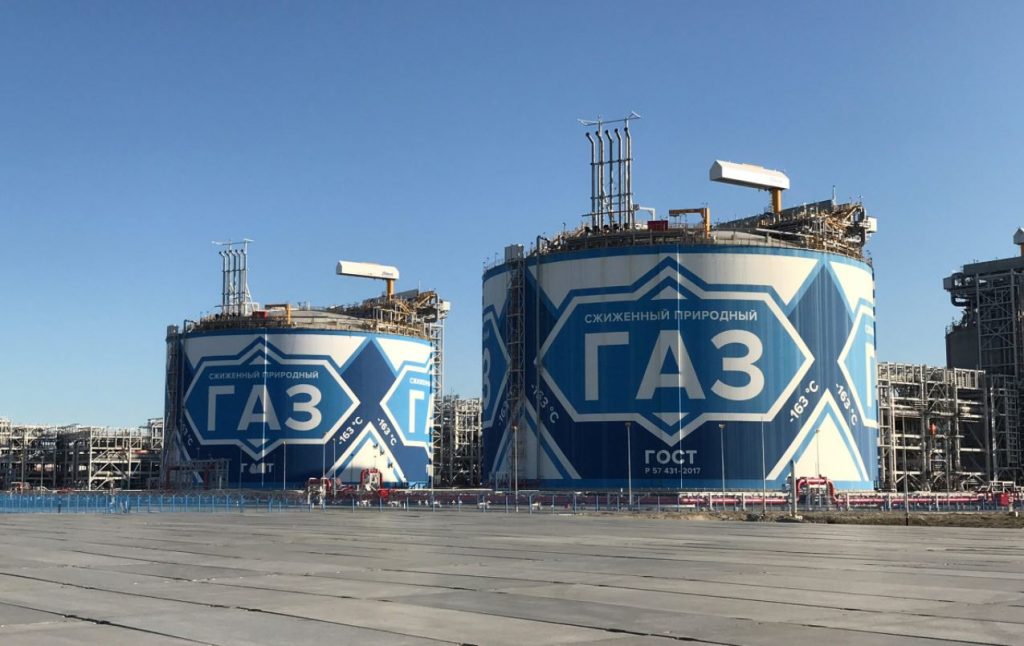Russian independent producer Novatek is nearing the launch of full operations at its fourth Yamal LNG train which features the firm’s proprietary liquefaction technology.
The unit has a capacity of 900 thousand tons per year. It started pilot LNG production in December last year adding to the three 5.5 mtpa units already in production at the plant in the Russian Arctic.
“The overall progress on Train 4 was slightly more than 96 percent complete, with over 1,200 personnel still working at the construction site,” Novatek’s finance chief Mark Gyetvay said on Wednesday during a conference call discussing the company’s quarterly results.
He said the main construction activities for the project were essentially completed, but some seasonal work activities were performed in the first quarter that did not impact the commissioning stage.
“We have now produced several thousand tons of LNG under the cooldown method using the main heat exchanger designed to handle commercial volumes, and the full commissioning and start-up of equipment and systems to design mode is currently underway,” he said.
“You can theoretically say that the volumes already produced during the commissioning phase and sent to storage tanks have been sold, but we are anticipating formal commercial production within the upcoming weeks,” Gyetvay said.
To remind, the CFO said in February Novatek had planned to launch full operations at the LNG train in the “upcoming weeks.”
Yamal LNG ships 690 cargoes
The giant Yamal LNG project has shipped 690 cargoes or 50.4 million tons since the launch of the first train back in 2017.
In addition, the project has also dispatched 102 shipments of stable gas condensate.
As per the first quarter this year, Yamal LNG shipped 66 cargoes or 4.85 million tons. The project sold 52 cargoes, or 79 percent, under long-term contracts and the remaining under spot transactions, according to Gyetvay.
During the January-March period, Yamal LNG produced almost 5 million tons of LNG
and roughly 270 thousand tons of unstable gas condensate.
Arctic LNG 2 reaches 39 percent completion
Novatek is also pushing forward with the construction of its second Arctic LNG export.
The project located on the Gydan peninsula includes the construction of three LNG trains with a capacity of 6.6 mtpa, each, using gravity-based structure platforms.
The project had reached a 39 percent completion as of the end of the first quarter, Gyetvay said, adding that the first GBS was about 53 percent complete.
“We made great progress towards launching the first GBS as planned in 2023, and estimate that roughly 80 percent of the concrete casting, or 140 thousand cubic meters of concrete has already been poured for the platform at the dry dock,” he said.
“At the second dry dock, we have poured approximately 85 thousand cubic meters of concrete for the second GBS and estimate that this process is about 49 percent completed,” he said.
Overall, about 5,400 construction workers for the GBS contractors are presently onsite in Murmansk.
Moreover, Novatek expects the first set of modules for the first GBS to arrive from China to Murmansk this upcoming September 2021. The first set of modules for the second GBS should land in Murmansk in May 2022.
As of today, about 15,000 workers have been mobilized for the module construction works in China. “We see no problem in meeting our timetables for delivery,” Gyetvay said.
LNG-powered bunkering vessels at transshipment hubs
In order to reduce transportation costs and shipping time, Novatek is also building LNG transshipment terminals in the Kamchatka and Murmansk regions.
The floating units will transship Yamal and Arctic 2 cargoes from ice-breaking LNG carriers to conventional ships.
These hubs will also have bunkering vessels that go on LNG, according to Gyetvay.
“We will use LNG to replace fuel-blend oil products for our future bunkering vessels at our
transshipment complexes,” he said.
“The use of LNG as bunkering fuel complies with the stricter IMO requirements and leads to cutting CO2 and NOX emissions by roughly 27% and 76%, respectively,” he said.

